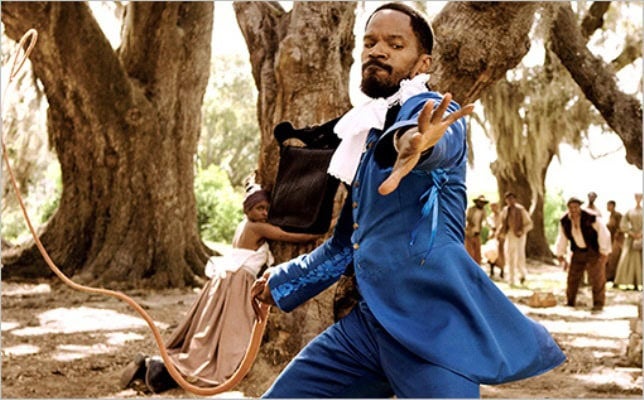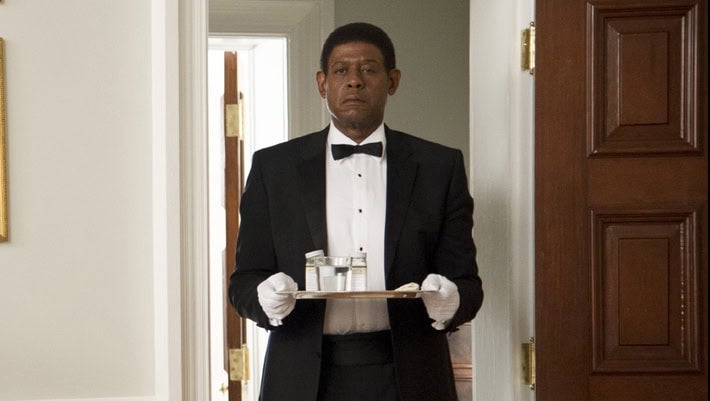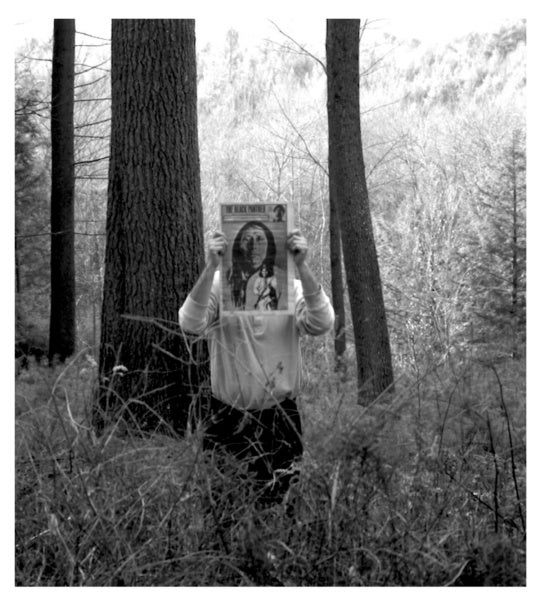
Despite the experiences of segregation, the Civil Rights movement, the Black Power movement, the Rodney King beating, the election of a black president, and any number of daily news events that highlight the ongoing divide between white and black America, white America seems perpetually in the process of “discovering” the black experience via the multiplex.
In truth, movies have played a powerful part in amplifying American history through the lens of the black experience, as well as showing Americans that their history is far uglier than their middle school textbooks professed. Those of us who worship at the church of cinema and see film’s potential to change deep-seated beliefs often hope that if the apparent injustice of events like the Trayvon Martin killing was lost on some Americans, the profoundly disturbing example of American history offered in films like 12 Years a Slave might illuminate the black experience in a more lasting way. It’s the promise of art after all, that so many of us cling to: to inspire people on a deeper and more profound level than the hectoring, obnoxious black and white posturing of our political discourse.
Four recent films, Lee Daniels’ The Butler, Django Unchained, 12 Years a Slave, and Lincoln have dealt with slavery in overt and tangential ways. The films lay a trail of breadcrumbs for understanding why slavery might exist simultaneously as a profoundly entwined part of the black experience and as a void of history for many non-African Americans. These films stoke different desires: in The Butler, a desire to acknowledge the fortitude of an individual, Cecil Gaines (Forest Whitaker), who escaped a slavery economy to work for a succession of American presidents in the White House. The Butler subscribes to a more conventional film genre, the feel-good bio picture that highlights the unique and exceptional path of one man to overcome great obstacles. Of the quartet, it’s the easiest to swallow, a Forrest Gump rendition of history. In many ways Steven Spielberg’s Lincoln slogs a similar path as another great man biopic that avoids lingering treatment of the reality of slavery that divided Lincoln’s America.

It’s hard not to play favorites, based on the profound differences in artistry in these various films. It may have taken an Englishman and a visual artist, skilled in nuance and subtext, to reveal slavery in all of its dimensions, as Steve McQueen does in 12 Years a Slave. More than just an historical evocation of the reality of slavery, 12 Years a Slave clarifies subtler aspects of the slave economy in stark terms that cut to the heart of lived experience. For one, 12 Years reveals the perverse psychological chess game between master and slave, as the slaves struggle to avoid angering or offending their white captors, and the potential of death or dismemberment. McQueen conveys the frightening intimacy of this relationship as the slaves in 12 Years a Slave try to gauge their oppressors’ intentions.
In the spirit of Julie Dash’s Daughters of the Dust and the plainspoken brutality of Kara Walker’s artworks, McQueen’s film takes a far more contemplative, slow burn approach to the subject of slavery than most, looking at the experience through an ongoing interest in power and powerlessness. The film is centered on the real-life experience, recounted in an 1853 book, of Solomon Northrop (Chiwetel Ejiofor), who lived as a free man in Saratoga Springs, New York. The film follows the nightmare circumstance as Northrop is duped into traveling away from his family, kidnapped, and sold as a slave. Northrop loses all traces of his previous identity and winds up under the nightmare thumb of a religious zealot slave owner Edwin Epps (Michael Fassbender), who sees slavery as a divine right and his slaves as both his possessions and play things.
Beyond the sadism of forced labor, rape, and the treatment of human beings like animals, McQueen’s film highlights the perverse head games of a husband routinely raping one of his slaves, the delicate, child-like Patsey (Lupita Nyong’o), and the growing sadism of his wife in punishing Patsey for “her” transgressions. The film often reads like science fiction in its depiction of the utterly surreal world of slavery, where hierarchies allowed some African Americans like Mistress Shaw (Alfre Woodward), the black wife of a white slave owner, to live in a privileged, protected state, and others to suffer unspeakable, sadistic tortures based solely on the whims of their owners.

As is the case in so many films, it is the quality of the film and how it moves an audience that is often the most concrete measure of its success. Seeing 12 Years a Slave in the South, for instance, is a reminder of how profoundly a film can act on an audience. A preview screening of 12 Years a Slave meant audience walk-outs during the film’s prolonged, excruciating scene of Patsey being whipped, almost to death, and also the kind of mournful weeping from members of the audience that comes with deep loss and heartache.
With all of the progress and healing time provides, films about slavery clearly still unleash powerful emotions, a sense of despair at this widespread crime scene in American history. It is hard to miss how deeply the film works on an African-American audience and why it might offer both a welcome treatment of a history we can often seem to have learned little from and a deeply troubling echo of lingering racial disparities in America.
If McQueen’s film shows the psychological toll of slavery, Quentin Tarantino’s Django Unchained is the outlandish, volatile, crazed action film of slavery meant to expunge feelings of powerlessness and sadness for the thrill of bloody justice. Perhaps its $400+ million 2012 box office earnings were the result of creating a film both whites and blacks could feel good about, where the slaves are victorious and the evil slave owners are vanquished. It’s a nursery school fantasy of the triumph of good over evil, but one that affords a soothing sense of relief that the more layered and thoughtful 12 Years a Slave does not. 12 Years offers no such catharsis. Though Solomon Northrop escapes the bonds of slavery, his salvation is bittersweet, considering the slaves, like Patsey, he left behind.
As with his Inglourious Basterds, a revenge story that kicks Germany’s Nazi party in the teeth to the strains of David Bowie, Tarantino’s Django Unchained is a cathartic payback fantasy. Rednecks and yahoos are sent to the great beyond through the bromance team of German bounty hunter King Shultz (Christoph Waltz) and the slave he has helped to break out of bondage, Django (Jamie Foxx). Both are hot on the trail of Django’s wife Broomhilda (Kerry Washington) who’s been sold to another sadistic Mississippi plantation lord (Leonardo DiCaprio).

Tarantino delights in setting obvious villains against obvious victims, and if subtlety and nuance is lost in the process, so be it. But it was clear from the appreciation of many black viewers that the catharsis provided by Django Unchained—of seeing slavery depicted in all of its depravity and then watching the punishment of its vile perpetrators—shallow as it may have been, was not insignificant.
Tarantino and McQueen’s films are entirely different treatments of slavery that inspire very different emotions. One lets viewers emotionally off the hook in a cathartic spectacle of bloodletting while the other can linger in the mind for days with a sense of sadness about the capacity of society to privilege one group and debase another. While Tarantino allows his audience the escape valve of comedy, gore, and sweet revenge, the end of McQueen’s film places the viewer right back at the beginning. With its sustained and powerful examination of human degradation and sadism, 12 Years a Slave echoes too often a world that in many ways still operates on those same terms, where sexual slavery, discrimination, poverty, war-time savagery, and sadism remind us that wealth and power can often make its own judgments about who deserves to wear the badge of humanity and who does not.




